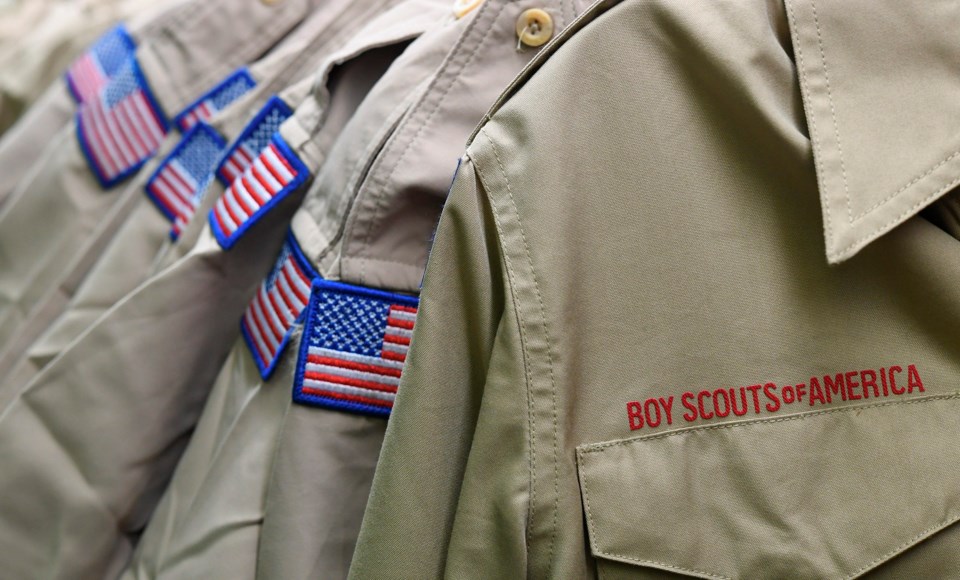NEW YORK — Under the supervision of a bankruptcy judge, the Boy Scouts of America has launched a nationwide advertising campaign to notify victims of decades-old sex abuse by Scout leaders that they have until Nov. 16 to seek compensation from a proposed fund.
Law firms say they have already signed up thousands of clients to submit claims since the Boy Scouts filed for bankruptcy protection in February in the face of hundreds of lawsuits. Some lawyers predict the number of people filing claims will surge past 20,000 by the November deadline.
“It’s frightening for the Boy Scouts, because they realize it’s going to take a lot of money to get out of this bankruptcy,” said Andrew Van Arsdale, a lawyer with a network called Abused in Scouting that says it has signed up more than 8,000 clients.
The Boy Scouts' court-approved ad campaign began Monday and is scheduled to run through Oct. 17, at an estimated cost of $6.8 million. It includes print, television, radio and online ads in English and Spanish that are expected to reach more than 100 million people, including more than 95% of the primary target audience of men 50 and older.
The ads direct people to a Boy Scout
Lawyer Paul Mones, who won a $19.9 million sex-abuse verdict against the Boy Scouts in Oregon in 2010, described the campaign as historic.
“Despite all the publicity surrounding the bankruptcy, this is the first time that the BSA has ever formally and publicly acknowledged on a wide-scale basis its long-standing problem of sexual abuse,” Mones said.
The bankruptcy has been painful for the 110-year-old Boy Scouts, which has been a pillar of American civic life for generations and a training ground for future leaders. But its finances were already strained by sex-abuse settlements and declining membership — now below 2 million from a peak of over 4 million in the 1970s.
Most of the pending sex-abuse claims date to the 1960s, ’70s and ’80s, before the Boy Scouts adopted criminal background checks, abuse-prevention training for all staff and volunteers, and a rule that two or more adult leaders must be present during activities.
The potential size of the bankruptcy compensation fund is not yet known. The organization is expected to contribute a substantial portion of its assets, which include financial investments and real estate. The Boy Scouts' insurers also will be contributing, although they have been trying to limit their exposure.
Attorney Christopher Hurley of the Chicago-based law firm Hurley McKenna & Mertz, which says it represents more than 2,500 potential claimants, said lawyers are braced for tough negotiations with the insurers.
“If they’re smart, they'll find a way to resolve this in a fair way,” Hurley said. “With 100% certainty, we’re not going out anywhere until there’s justice for these survivors.”
Another contentious issue is the extent to which the Boy Scouts’ roughly 260 local councils will contribute to the fund.
In its bankruptcy filing, the national organization said the councils, which have extensive property holdings and other assets, are separate legal entities and should not be included as debtors in the case. An ad hoc committee representing the councils is negotiating what they will pay in.
“Any settlement must involve not only BSA but also the local councils and insurance companies,” said Seattle-based attorney Mike Pfau, whose team represents more than 630 potential claimants. “There can be no meaningful settlement without significant contributions from both of them.”
Last week, as the Boy Scouts prepared to launch its ad campaign, its lawyers filed a motion with the federal bankruptcy court in Delaware that's handling the case, asking a judge to restrict ads from law firms trying to solicit business from victims.
Boy Scout attorneys said at least 11,000 television spots have aired and that many contain false or misleading statements that are at odds with the notification language approved by the court.
Among the misleading statements, according to Boy Scout attorneys, are assertions that victims can file claims anonymously and that financial compensation is “ensured.” Some ads say a compensation fund that may be worth more than $1.5 billion is being set up, although there has been no official projection of such an amount.
At a hearing Monday, the judge declined to approve an order restricting the ads, saying it was “incredibly broad” and raised concerns about First Amendment issues.
The Boy Scouts said in a statement that some of the law firms’ ads had the potential to confuse victims and undercut the effectiveness of its court-approved ads that it called “clear, accurate, impartial, informative, and sensitive to survivors.”
David Crary, The Associated Press



